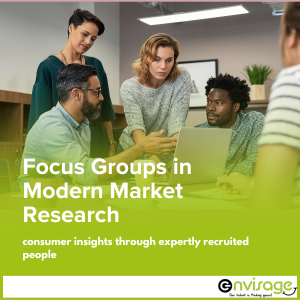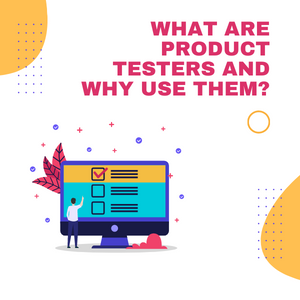What are product testers and why use them? Why do some products survive and others…
The Value of Focus Groups in Modern Market Research
When it comes to understanding people’s opinions, habits, and motivations, few tools are as insightful as the focus group. Across the UK and Europe, brands and organisations are continuing to use focus groups to gain a richer understanding of how real consumers think and feel.
At Envisage Promotions, we work behind the scenes to help research teams find the right people for these discussions—diverse, reliable participants who reflect real audiences. But beyond recruitment, it’s worth taking a closer look at why focus groups remain such a vital part of modern research.
Why Use Focus Groups?
In an age of digital surveys and data dashboards, it might be tempting to rely solely on numbers. Yet according to the Market Research Society, nearly three-quarters of brands believe that qualitative methods, such as focus groups, offer deeper and more meaningful feedback than quantitative surveys alone.
The reason is simple: focus groups provide context.
They go beyond “what” people think and explore “why” they think that way. A skilled moderator can uncover emotions, motivations, and even contradictions that help shape a fuller understanding of consumer behaviour.
Some of the key benefits include:
-
Open discussion: Participants can express opinions freely, offering insight that structured surveys might miss.
-
Real-time reactions: Whether testing a new product, advert, or service, immediate feedback reveals how people truly respond.
-
Dynamic interaction: The group environment encourages participants to react to each other’s ideas, sparking new perspectives.
-
Depth of understanding: Rather than simple yes/no answers, focus groups reveal the reasoning behind decisions and attitudes.
For researchers, these conversations can be invaluable in refining strategy, improving products, and ensuring messaging resonates.
Recruiting the Right Participants for Focus Groups
The quality of a focus group depends heavily on who’s in the room. It’s not just about finding people who fit a demographic profile—it’s about ensuring they are engaged, articulate, and willing to share honest opinions.
That’s where specialist recruitment comes in. Agencies like Envisage Promotions focus on matching participants to the exact requirements of each study, whether the criteria involve age, occupation, location, or lifestyle.
A typical recruitment process includes:
-
Detailed profiling to match the study’s target audience
-
Screening interviews to assess suitability and engagement
-
Scheduling and attendance management to keep sessions running smoothly
-
Confidentiality and data protection, in line with GDPR and ethical research standards
This level of preparation ensures discussions are productive, well-balanced, and relevant to the research objectives.
UK and European Coverage
Consumer behaviour varies not only between demographics but also across regions and countries. For brands operating internationally, running focus groups in multiple locations helps highlight cultural differences, regional preferences, and varying perceptions of products or services.
Through an established network of participants, focus groups can be organised across the UK and Europe—from large metropolitan areas such as London, Manchester, Paris, and Berlin to smaller regional hubs.
Online focus groups have also become a practical and flexible alternative, especially when projects require a wide geographical spread. They allow researchers to gather insights from multiple markets simultaneously, while maintaining the conversational depth that makes qualitative research so valuable.
Ensuring Diversity and Representation
A strong focus group is one that mirrors the diversity of real life. This means including participants from different backgrounds, ethnicities, income levels, and experiences. Representation ensures findings are inclusive and relevant, helping brands avoid narrow or biased insights.
At Envisage Promotions, participant networks are built to reflect this diversity. Recruitment typically covers:
-
A range of ages—from Generation Z to Baby Boomers
-
Ethnically diverse communities across urban and rural areas
-
Varied professions, education levels, and lifestyles
-
Groups such as parents, students, professionals, and retirees
This breadth of participation ensures that discussions capture a true mix of voices, creating richer, more accurate research outcomes.
In-Person and Online Focus Groups
While traditional face-to-face focus groups remain popular, especially for testing tangible products or advertising materials, virtual focus groups have become increasingly common.
Each method offers distinct advantages:
-
In-person sessions allow researchers to observe non-verbal cues—body language, expressions, and group dynamics that can add depth to analysis.
-
Online sessions, on the other hand, make it easier to include participants from different locations, reduce travel time, and keep projects cost-effective.
Choosing between the two often depends on the objectives of the research, the audience being studied, and practical considerations like time and budget. Many organisations now use a combination of both, depending on the nature of the study.
Data Protection and Ethical Considerations
Focus group recruitment and management must comply with strict ethical and legal standards. In the UK, this includes following GDPR regulations for data protection and ensuring that all participants give informed consent.
Participants should understand the purpose of the study, how their data will be used, and that their contributions will remain confidential. Ethical practices not only protect participants but also strengthen the credibility of the research findings.
The UK Government’s guidance on research ethics provides a clear framework for maintaining these standards, and reputable recruitment agencies work in line with this at all times.
The Ongoing Role of Focus Groups
Despite technological advances and the rise of digital analytics, focus groups remain an essential part of the research toolkit. Their value lies in the human connection—they allow researchers to listen, observe, and explore topics in depth.
For example:
-
A technology company might use focus groups to explore how users interact with a new app interface.
-
A food brand could test packaging designs or new flavours with target consumers.
-
A government body might use them to understand public opinion around new policies.
In each case, the conversations provide rich qualitative data that helps decision-makers see beyond the numbers.
Working with Envisage Promotions
Behind many successful research projects is a reliable recruitment process. At Envisage Promotions, we collaborate with market research agencies, brands, and consultancies to source participants who bring genuine insight and diversity to every study.
With over 10,000 individuals in our active database and experience working across multiple industries, our team supports projects of all scales—from small local discussions to international research programmes.
While recruitment is our focus, our wider aim is to help researchers get the most accurate, authentic, and useful feedback possible.
Focus groups continue to play a vital role in helping organisations understand real people. They provide space for dialogue, emotion, and exploration—elements that are often lost in purely quantitative data.
Successful focus groups depend on careful planning, thoughtful moderation, and most importantly, the right participants. Recruiting those participants takes time, understanding, and attention to detail—qualities that define our work at Envisage Promotions.
If your next project involves qualitative research and you need to hire focus groups across the UK or Europe, taking the time to find well-matched, engaged participants will make all the difference.




